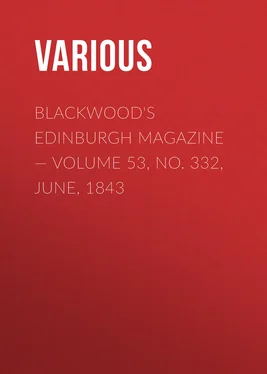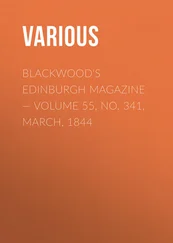Various - Blackwoods Edinburgh Magazine – Volume 53, No. 332, June, 1843
Здесь есть возможность читать онлайн «Various - Blackwoods Edinburgh Magazine – Volume 53, No. 332, June, 1843» — ознакомительный отрывок электронной книги совершенно бесплатно, а после прочтения отрывка купить полную версию. В некоторых случаях можно слушать аудио, скачать через торрент в формате fb2 и присутствует краткое содержание. Жанр: foreign_antique, periodic, foreign_edu, на английском языке. Описание произведения, (предисловие) а так же отзывы посетителей доступны на портале библиотеки ЛибКат.
- Название:Blackwoods Edinburgh Magazine – Volume 53, No. 332, June, 1843
- Автор:
- Жанр:
- Год:неизвестен
- ISBN:нет данных
- Рейтинг книги:4 / 5. Голосов: 1
-
Избранное:Добавить в избранное
- Отзывы:
-
Ваша оценка:
- 80
- 1
- 2
- 3
- 4
- 5
Blackwoods Edinburgh Magazine – Volume 53, No. 332, June, 1843: краткое содержание, описание и аннотация
Предлагаем к чтению аннотацию, описание, краткое содержание или предисловие (зависит от того, что написал сам автор книги «Blackwoods Edinburgh Magazine – Volume 53, No. 332, June, 1843»). Если вы не нашли необходимую информацию о книге — напишите в комментариях, мы постараемся отыскать её.
Blackwoods Edinburgh Magazine – Volume 53, No. 332, June, 1843 — читать онлайн ознакомительный отрывок
Ниже представлен текст книги, разбитый по страницам. Система сохранения места последней прочитанной страницы, позволяет с удобством читать онлайн бесплатно книгу «Blackwoods Edinburgh Magazine – Volume 53, No. 332, June, 1843», без необходимости каждый раз заново искать на чём Вы остановились. Поставьте закладку, и сможете в любой момент перейти на страницу, на которой закончили чтение.
Интервал:
Закладка:
"A friend of mine," said he, "a captain in the Lichtenstein hussars, happened to be on the outpost service of the army. As the enemy were in great force, and commanded by the Vizier in person, an action was daily expected, and the pickets and videttes were ordered to be peculiarly on the alert. But, on a sudden, every night produced some casualty. They either lost videttes, or their patrol was surprised, or their baggage plundered—in short, they began to be the talk of the army. The regiment had been always one of the most distinguished in the service, and all those misfortunes were wholly unaccountable. At length a stronger picket than usual was ordered for the night—not a man of them was to be found in the morning. As no firing had been heard, the natural conjecture was, that they must all have deserted. As this was a still more disgraceful result than actual defeat, the colonel called his officers together, to give what information they could. The camp, as usual, swarmed with Bohemians, fortune-tellers, and gipsies, a race who carry intelligence on both sides; and whose performances fully accounted for the knowledge which the enemy evidently had of our outposts. The first order was, to clear the quarters of the regiment of those encumbrances, and the next to direct the videttes to fire without challenging. At midnight a shot was heard; all turned out, and on reaching the spot where the alarm had been given, the vidette was found lying on the ground and senseless, though without a wound. On his recovery, he said that he had seen a ghost; but that having fired at it, according to orders, it looked so horribly grim at him, that he fell from his horse and saw no more. The Austrians are brave, but they are remarkably afraid of supernatural visitants, and a ghost would be a much more formidable thing to them than a discharge of grape-shot.
"The captain in question was an Englishman, and as John Bull is supposed, among foreigners, to carry an unusual portion of brains about him, the colonel took him into his special council in the emergency. Having settled their measures, the captain prepared to take charge of the pickets for the night, making no secret of his dispositions. At dark, the videttes and sentries were posted as usual, and the officer took his post in the old field redoubt, which had been the headquarters of the pickets for the last fortnight.
"All went on quietly until about midnight; the men off duty fast asleep in their cloaks, and the captain reading an English novel. He, too, had grown weary of the night, and was thinking of stretching himself on the floor of his hut, when he saw, and not without some perturbation, a tall spectral figure, in armour, enter the works, stride over the sleeping men without exciting the smallest movement amongst them, and advance towards him. He drew his breath hard, and attempted to call out, but his voice was choked, and he began to think himself under the dominion of nightmare. The figure came nearer still, looking more menacing, and drew its sword. My friend, with an effort which he afterwards acknowledged to be desperate, put his hand to his side to draw his own. What was his alarm when he found that it had vanished? At this moment his poodle, which, against all precautions, had followed him, began barking fiercely, and rushing alternately towards him and a corner of the redoubt. Though his sabre was gone, a brace of English pistols lay on the table beside him, and he fired one of them in the direction. The shot was followed by a groan and the disappearance of the spectre. The men started to their feet, and all rushed out in pursuit. The captain's first step struck upon a dead body, evidently that of the spy who had fallen by his fire. The pursuit was now joined in by the whole regiment, who had been posted in the rear unseen, to take advantage of circumstances. They pushed on, swept all before them, and bore down patrol and picket until they reached the enemy's camp. The question then was, what to do next? whether to make the best of their way back, or try their chance onward? The Englishman's voice was for taking fortune at the flow; and the accidental burning of a tent or two by the fugitives showed him the Turks already in confusion. The trampling of battalions in the rear told him at the same time that he had powerful help at hand, and he dashed among the lines at once. The hussars, determined to retrieve their reputation, did wonders—the enemy were completely surprised. No troops but those in the highest state of discipline are good for any thing when attacked at night. The gallantry of the Turk by day, deserts him in the dark; and a night surprise, if well followed up, is sure to end in a victory. From the random firing and shouting on every side, it was clear that they were totally taken unawares; and the rapid and general advance of the Austrian brigades, showed that Laudohn was in the mind to make a handsome imperial bulletin. Day dawned on a rout as entire as ever was witnessed in a barbarian campaign. The enemy were flying in all directions like a horde of Tartars, and camp, cannon, baggage, standards, every thing was left at the mercy of the pursuers."
"But the captain, the Englishman, what became of him?" I asked, slightly glancing at the countenance of the narrator.
"Oh, very well off indeed! Foreign Governments are showy to the soldier, and Joseph the Second, though an economist in civil matters, was liberal to his successful officers. The captain received a pension; a couple of orders; was made a colonel on the first opportunity; and, besides, had his share of the plunder—no slight addition to his finances, for the military chest had been taken in the baggage of the Seraskier."
"And by this time," said I, with an unenquiring air, "he is doubtless a field-marshal?"
"Nothing of the kind," replied my reverend friend, "for his victory cured him of soldiership. He was wounded in the engagement, and if he had been ever fool enough to think of fame, the solitary hours of his invalidism put an end to the folly. Other and dearer thoughts recurred to his mind. He had now obtained something approaching to a competence, if rightly managed; he asked permission to retire, returned to England, married the woman he loved; and never for a moment regretted that he was listening to larks and linnets instead of trumpets and cannon, and settling the concerns of rustics instead of manœuvring squadrons and battalions."
"But what was the ghost, after all?"
"Oh, the mere trick of a juggler! a figure projected on the wall by some ingenious contrivance of glasses. The instrument was found on the body of the performer, who turned out to be the colonel's valet—of course in the enemy's pay, and who furnished them with daily intelligence of all our proceedings. As for the loss of the sabre, which actually startled the ghost-seer most, he found it next morning hanging up in the hut, where he himself had placed it, and forgotten that he had done so."
"And the captain, or rather the colonel, brought with him to England, a cimeter-cut on his arm, and another on his forehead?" I asked, fixing my eyes on him. A crimson flush passed over his countenance, he bit his lip and turned away. I feared that I had offended irreparably. But his natural kindliness of heart prevailed, he turned to me gently, laughed, and pressing my hand in his, said, "You have my secret. It has escaped me for the first time these thirty years. Keep it like a man of honour."
I have always held that the life of man's mind, where man has a mind—which is not always the case—is a thing of fits and starts. I even doubt whether any one who will take the trouble to recollect, will not be able to put his finger on the precise periods at which new views of every thing suddenly opened before him, and he emerged at once, if not into new powers, at least into a new use of them. The frame may grow like a tree; the faculties may grow as imperceptibly as the frame; but the mind acquires that knowledge of life which forms its exercise, its use, and perhaps its essence, by bounds and flights. This moonlight walk with my old and honoured Mentor, was the beginning of my mental adolescence. My manhood was still to come, and with a more severe instructor.
Читать дальшеИнтервал:
Закладка:
Похожие книги на «Blackwoods Edinburgh Magazine – Volume 53, No. 332, June, 1843»
Представляем Вашему вниманию похожие книги на «Blackwoods Edinburgh Magazine – Volume 53, No. 332, June, 1843» списком для выбора. Мы отобрали схожую по названию и смыслу литературу в надежде предоставить читателям больше вариантов отыскать новые, интересные, ещё непрочитанные произведения.
Обсуждение, отзывы о книге «Blackwoods Edinburgh Magazine – Volume 53, No. 332, June, 1843» и просто собственные мнения читателей. Оставьте ваши комментарии, напишите, что Вы думаете о произведении, его смысле или главных героях. Укажите что конкретно понравилось, а что нет, и почему Вы так считаете.












